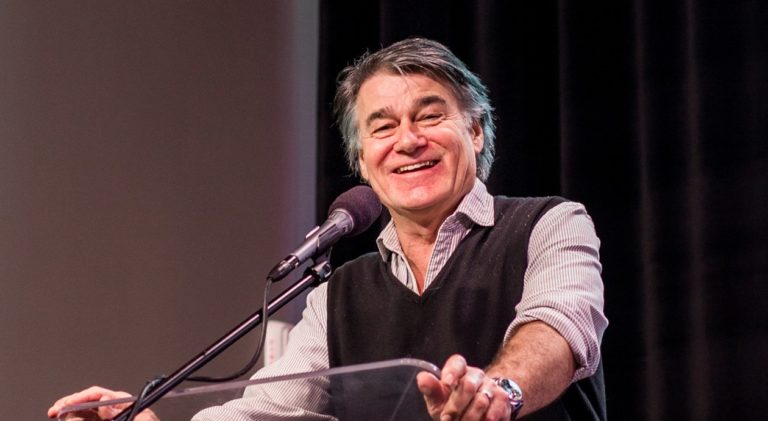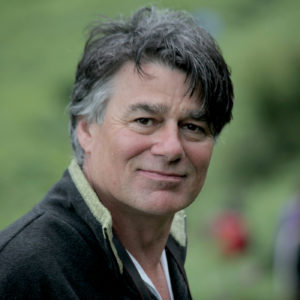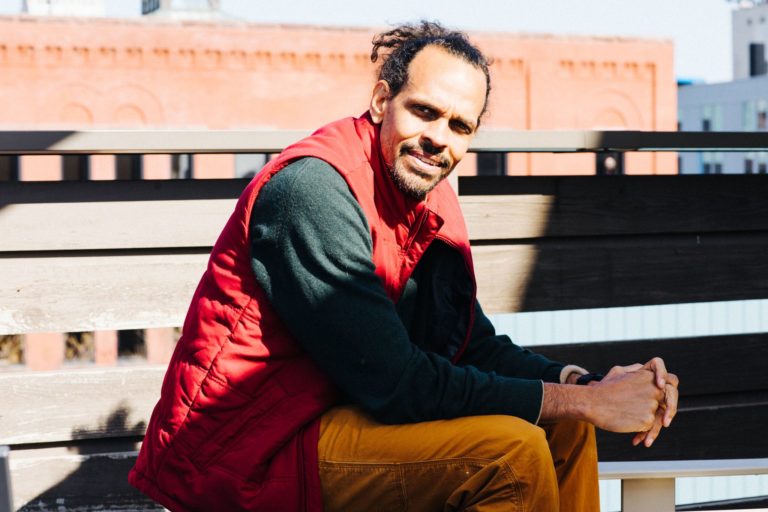David Whyte
Poetry from the On Being Gathering (Closing Words)
“The sense of having walked from far inside yourself / out into the revelation, to have risked yourself / for something that seemed to stand both inside you / and far beyond you, that called you back”
David Whyte sent us out into the world at the end of the first On Being Gathering — a four-day coming-together of the On Being community for reflection, conversation, and companionship — at the 1440 Multiversity in the redwoods of Scotts Valley, California.

Image by Bethany Birnie, © All Rights Reserved.
Guest

David Whyte is the author of many books of poetry and prose. He grew up with a strong, imaginative influence from his Irish mother among the hills and valleys of his father’s Yorkshire. He now makes his home in the Pacific Northwest of the United States. He holds a degree in Marine Zoology and has worked as a naturalist guide in the Galapagos Islands. His books include The Heart Aroused: Poetry and the Preservation of the Soul in Corporate America, Consolations: The Solace, Nourishment and Underlying Meaning of Everyday Words, and The Bell and the Blackbird. His latest collections are David Whyte: Essentials and Still Possible.
Transcript
Krista Tippett: Poetry reading framed the On Being Gathering this year, and we are so happy now to share these slices of beauty, elation, and contemplation with you. Here’s how David Whyte sent us out into the world with a poetic benediction.
David Whyte: I’m really not sure I have anything to add to the richness. It’s been almost a vendetta of meaning, over the last…
[laughter]
…in which we’ve been beaten into surrender. But it really is about a surrender; and it’s a surrender to the doorway that each of us has to walk through, taking the path of vulnerability into our future life.
There’s a great moment in a Seamus Heaney poem, series of poems called “Station Island,” where he goes off and has this great spiritual experience in this very well-known pilgrimage site called Station Island, in Lough Derg, in Ireland. And at the end of it, he’s feeling very, very spiritual and very, very exalted. He’s been fasting for three days — and almost beyond his artistry and his writing. But as he’s coming off the island, he meets the shade, the ghost, of James Joyce. And James Joyce looks at him, and James Joyce has an ash stick in his hand, and he strikes this litter bin with it, makes a loud clanging noise. And he says, “Your obligation / is not discharged by any common rite.” “Let others wear the sack-cloth and ashes. / Let go, let fly, forget. / You’ve listened long enough. Now strike your note.” And the invitation is back to your own doorway of vulnerability, which you must walk through.
We tend to think of vulnerability as a kind of weakness, something to be walked around. But it’s interesting to look at the origin of the word, from the Latin word “vulneras,” meaning “wound.” It’s really the place where you’re open to the world, whether you want to be or not. You’re just made that way. You were just grown that way. You feel that way. You feel the pain of others that way, and you feel your own pain that way. And it’s actually interesting to think about it not as a weakness but as a faculty for understanding what’s about to happen and where you need to go — the ability to follow the path of vulnerability. And yet, as human beings, we’re constantly hoping that we can find a pathway we can follow right to the end, which will never disappear; where we won’t have our hearts broken. We first of all try that in romance. Every time you have a new relationship, you say, “At last, the person who will not break my heart.”
[laughter]
No. You’ve chosen them out for that exact core competency. [laughs] Why? Because you care about them. Anything you care about will break your heart. It will move out of your line of control and understanding at times.
Then we go into our work, and we hope, in work, with the armored professionality of a vocation, that we’ll be held immune from the heartbreaks of life. But if you’re sincere about your work, you should not know how to proceed, at times. That tells you you’re sincere. You should not know how to get from here to there.
And that puts you into a proper relationship with the world. Why? Because you have to ask for help. You have to make the invitation to the people who will help you create the conversation, which will help you follow that path of vulnerability into the world and give your gift to others along the way.
Then we have parenting. And the first thought is to bring a child into the world, to bring joy into the world and to bring joy to you. But you’re also bringing your own particular form of intimate heartbreak into your life. There’s never been a mother or father, since the beginning of time, who hasn’t had their heart broken by their child. And they don’t even need to do anything spectacular.
[laughter]
But usually, they do, do something spectacular. [laughs] But all they really need to do is move away from you, grow out of the child you first knew, grow out of infancy, grow out of their adolescence, and then, leave the door. And then they live with you, as spies and saboteurs for years, watching your every psychological move.
[laughter]
Until one day, when you have your back turned to them in the kitchen, one day when you’re making something for them, the emotional stiletto goes in exactly the right place, and you say, “How did you know exactly where to place it?” And they say, “I’ve been watching you.” [laughs] You can’t have a child without being humiliated. They will see your flaws. They will see where you are not held together properly.
Any real conversation moves along an axis of vulnerability. Without vulnerability, there’s no conversation. So what would it be like, actually, to cultivate a robust vulnerability? To stop trying to follow a road where I won’t have my heart broken? The only way you can not have your heart broken is not to care.
So this is a piece about the supposed endpoint, which we’re supposedly at here, at the end of our weekend together, where we’ve been privileged to hear such lyricism, such articulate representation of so many different voices, marginalized voices and voices long gone and voices that are intimated we might hear in the future. It’s a piece I wrote, called “Santiago,” inspired by the Camino de Santiago in northern Spain, which is one of our great ecumenical pilgrimages in the world today. It used to be just a Catholic pilgrimage, and now there are people of all persuasions and no persuasions at all walking that road.
In Spanish, there are three beautiful lines by Antonio Machado, where he talks about the Camino; and he says, “Caminante, no hay camino, / se hace camino al andar. / Al andar se hace el camino” — “Pathmaker, there is no path. You make the path by walking. By walking, you make the path.” And if you want a free glass of red wine in Madrid, you shout this out in broken Spanish, and the whole bar finishes it with you, and then you get a free glass of vino tinto.
So this is the approach to the supposed endpoint, which, of course, to the sincere pilgrim, begins to change and transmute and transfigure the closer your approach. “Santiago” — “The road seen, then not seen, the hillside / hiding then revealing the way you should take, / the road dropping away from you as if leaving you / to walk on thin air, then catching you, holding you up, / when you thought you would fall, / and the way forward always in the end / the way that you came, the way that you followed, the way that carried you / into your future, that brought you to this place, / no matter that it sometimes had to take your promise from you, / no matter that it always had to break your heart along the way: / the sense of having walked from far inside yourself / out into the revelation, to have risked yourself / for something that seemed to stand both inside you / and far beyond you, that called you back / in the end to the only road you could follow, walking / as you did, in your rags of love” — when I wrote that line, I said, “We’ll all end up in that costume one day” — “and speaking in the voice / that by night became a prayer for safe arrival, / so that one day you realized that what you wanted / had actually already happened and long ago and in the dwelling place / in which you lived before you began, / and that every step along the way, you had carried / the heart and the mind and the promise / that first set you off and then drew you on and that you were / more marvelous in your simple wish to find a way / than the gilded roofs of any destination you could reach: / as if, all along, you had thought the end point might be a city / with golden domes, and cheering crowds, / and turning the corner at what you thought was the end / of the road, you found just a simple reflection, / and a clear revelation beneath the face looking back / and beneath it another invitation, all in one glimpse: / like a person or a place you had sought forever, / like a bold field of freedom that beckoned you beyond; / like another life, and the road still stretching on.”
[applause]







Reflections